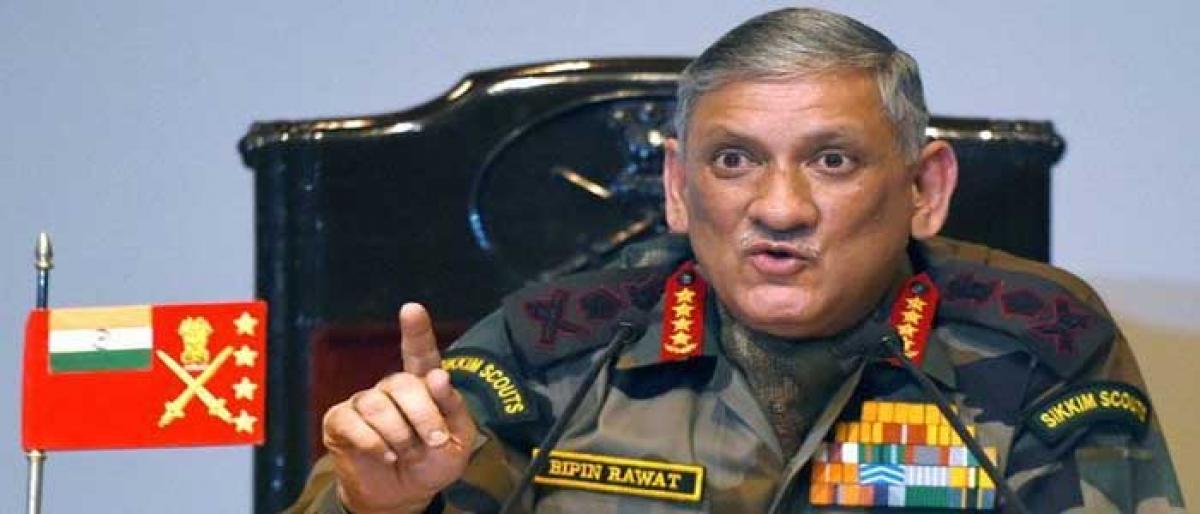Live
- Industrial parks to be set up in every constituency
- Edu institutions to receive fee reimbursement soon
- SP orders speedy disposal of PGRS petitions
- 11 get placement after completing CPBFI
- Balineni dares Chevireddy for an open debate
- SRM hosts IRIS-2024 summit
- Make AP solar hub: CM
- Pakistan Protests: PTI Supporters March Towards Islamabad, Demanding Imran Khan's Release
- Additional Collector Conducts Surprise Visit to Boys' Hostel in Wanaparthy
- Punjab hikes maximum state-agreed price for sugarcane, highest in country
Just In

A week after India and China ended their worst military confrontation in decades, Army Chief Gen Bipin Rawat has said the possibility of a two-front war against China on the North and Pakistan to the West cannot be ruled out.
Army Chief has not ruled out a two-front war against China, Pakistan
New Delhi: A week after India and China ended their worst military confrontation in decades, Army Chief Gen Bipin Rawat has said the possibility of a two-front war against China on the North and Pakistan to the West cannot be ruled out.
"As far as the northern adversary is concerned, flexing of muscles has started. Salami slicing, taking over territory in a very gradual manner, testing our limits or threshold is something we have to be wary about. Remain prepared for situations that are emerging gradually into conflict," he said about China.
“Salami slicing” refers to a string of small, clandestine operations meant to achieve a larger goal that would be difficult to accomplish in one go.
The Army Chief said on Wednesday that there was no denying that India has to stay prepared for conflict on its northern and western borders.
This is not the first time military leaders have warned of Pakistan possibly taking advantage of hostilities between India and China. He warned that a war with China could easily end up involving its long-term ally, Pakistan.
"Whether these conflicts will be limited and confined in space and time, or whether these can expand into an all-out war along the entire front with the Western adversary (Pakistan) taking advantage of the situation developing on the Northern border is very much likely."
This isn't the first time the Army Chief has spoken about the possibility of a two-front war, but the timing of his remarks indicates how sensitive the Army remains to the situation with China. The remarks come just a day after Prime Minister Modi and Chinese President Xi Jinping met on the sidelines of the BRICS summit in Xiamen in China.
Both leaders spoke of the need to "do more" to prevent border aggression. President Xi stressed to Modi that it's important for relations between the two countries to get on "the right track."
In mid-June, Indian soldiers crossed the border at Sikkim to stop China from constructing a new road on the remote Dokalm Plateau that Beijing considers its own, though India backs Bhutan's claim to the region. Enraged, China accused India of "illegally transgressing" into its terrain.
India said it had warned that the new road would be treated as a serious threat to the security of its northeastern states. Soldiers from both sides than stood eyeball-to-eyeball for more than 70 days, till both sides agreed, through diplomatic talks and despite daily shrill rhetoric from China, to withdraw their troops.
China has not clearly indicated whether it has abandoned its plans for the new road. Indian sources say Beijing has removed its bulldozers and other road-making equipment.
While discussions between Modi and President Xi have been described as being positive, India has decided to expand the scope of its military relationship with Japan which has a testy equation with China.
In a move likely to irk China, India and Japan on Wednesday significantly stepped up defence ties during the visit of Arun Jaitley to Tokyo on his last trip as Defence Minister before Nirmala Sitharaman replaces him on Thursday.

© 2024 Hyderabad Media House Limited/The Hans India. All rights reserved. Powered by hocalwire.com







